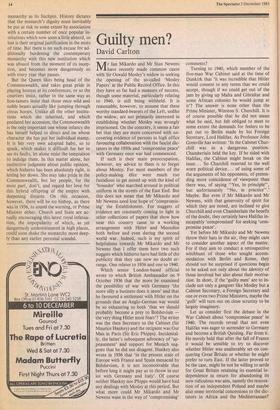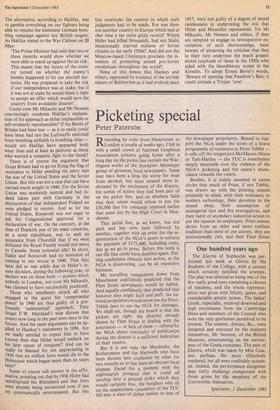Guilty men
David Carlton
Mr Ian Mikardo and Mr Stan Newens have recently made common cause with Sir Oswald Mosley's widow in seeking the opening of the so-called 'Mosley Papers' at the Public Record Office. In this they have so far had a measure of success, though some material, particularly relating to 1940, is still being withheld. It is reasonable, however, to assume that these worthy standard-bearers of the Left, unlike the widow, are not primarily interested in establishing whether Mosley was wrongly imprisoned.'On the contrary, it seems a fair bet that they are more concerned with un- covering evidence of persons in high office favouring collaboration with the fascist dic- tators in the 1930s and 'compromise peace' with Germany once war had commenced.
If such is their main preoccupation, however, my advice to them is to forget about Mosley. For most members of the policy-making elite were much too fastidious to get mixed up with the kind of 'bounder' who marched around in political uniform in the streets of the East End. But this does not mean that Mr Mikardo and Mr Newens need lose hope of 'compromis- ing' the Establishment. For nuggets of evidence are constantly coming to light in other collections of papers• that show how near this country came to a working arrangement with Hitler and Mussolini both before and even during the second world war. Indeed, such is my spirit of helpfulness towards Mr Mikardo and Mr Newens that I offer them here two such nuggets which hitherto have had little of the publicity that they can now no doubt ar- range. One relates to 1936 and one to 1940.
Which senior London-based official wrote to which British Ambassador on 9 October 1936 that the more he examined the possibility of war with Germany 'the more silly a business does it seem' and that he favoured a settlement with Hitler on the grounds that an Anglo-German war would be so exhausting to both 'that we should probably become a prey to Bolshevism the very thing Hitler most fears'? The writer was the then Secretary to the Cabinet (Sir Maurice Hankey) and the recipient was Our Man in Paris (Sir Eric Phipps). Incidental- ly, the latter's subsequent advocacy of 'ap- peasement' and support for Munich sug- gests that he did not disagree. Hankey also wrote in 1936 that 'in the present state of Europe with France and Spain menaced by Bolshevism, it is not inconceivable that before long it might pay us to throw in our lot with Germany and Italy'. Of course neither Hankey nor Phipps would have had any dealings with Mosley at this period. But what more could Mr Mikardo and Mr Newens want in the way of 'compromising' comments?
Turning to 1940, which member of the five-man War Cabinet said at the time of Dunkirk that 'it was incredible that Hitler would consent to any terms that we could accept, though if we could get out of the jam by giving up Malta and Gibraltar and some African colonies he would jump at it'? The answer is none other than the Prime Minister, Winston S. Churchill. It is of course possible that he did not mean what he said, but felt obliged to meet to some extent the demands for feelers to be put out to Berlin made by his Foreign Secretary, Lord Halifax. As Professor John Grenville has written: 'In the Cabinet Chur- chill was in a dangerous position. Chamberlain held the key. If he sided with Halifax, the Cabinet might break on the issue... So Churchill resorted to the well worn political device... of using some of the arguments of his opponents, of preten- ding more coincidence of viewpoint than there was, of saying "Yes, in principle", but unfortunately "No, in practice".' Maybe. But even if Mr Mikardo and Mr Newens, with that generosity of spirit for which they are noted, are inclined to give Churchill and even Chamberlain the benefit of the doubt, they certainly have Halifax in- escapably 'compromised' for seeking 'com- promise peace'.
Yet before Mr Mikardo and Mr Newens throw their hats in the air, they might care to consider another aspect of the matter. For if they aim to conduct a retrospective witchhunt of those who sought accom- modation with Berlin and Rome, they should not be surprised if questions begin to be asked not only about the identity of those involved but also about their motiva- tion, In short, if the 'guilty men' are to in- clude not only a gangster like Mosley but a Cabinet Secretary, a Foreign Secretary and one or even two Prime Ministers, maybe the 'guilt' will turn out on close scrutiny to be largely imaginary.
Let us consider first the debate in the War Cabinet about 'compromise peace' in 1940. The records reveal that not even Halifax was eager to surrender to Germany and become a British Quisling. Far from it. He merely held that after the fall of France it would be sensible to try to discover whether Hitler was unalterably set on con- quering Great Britain or whether he might prefer to turn East. If the latter proved to be the case, might he not be willing to settle for Great Britain retaining its essential in- dependence in return for abandoning its now ridiculous war aim, namely the restora- tion of an independent Poland and maybe also some territorial concessions to the dic- tators in Africa and the Mediterranean? The alternative, according to Halifax, was to gamble everything on our fighters being able to repulse the imminent German bom- bing campaign against key British targets. As Halifax stated to the War Cabinet on 28 May: 'The Prime Minister had said that two or three months would show whether we were able to stand up against the air risk. This meant that the future of the coun- try turned on whether thi enemy's bombs happened to hit our aircraft fac- tories. He was prepared to take the risk if our independence was at stake; but if it was not at stake he would think it right to accept an offer which would save the country from avoidable disaster'.
Could even Mr Mikardo and Mr Newens convincingly condemn Halifax's explana- tion of his approach as either implausible or self-evidently reprehensible? If the Battle of Britain had been lost — as it so easily could have been had not the Luftwaffe switched from bombing airfields to bombing cities would not Halifax have appeared both wiser than and at least as patriotic as those who wanted a romantic fight to the finish?
There is of course the argument that Great Britain had to go on flying the flag of resistance to Hitler pending the entry into the war of the United States and the Soviet Union. But this was not a case that can have carried much weight in 1940. For the Soviet Union was resolutely neutral and had in- deed taken part with Germany in the destruction of that independent Poland we were pledged to restore. And as for the United States, Roosevelt was not eager to ask for Congressional approval for a declaration of war. On the contrary, at the time of Dunkirk one of his main concerns, as a stout republican, was to seek an assurance from Churchill that if we were defeated the Royal Family would not move to Canada. Some potential ally! In short, Stalin and Roosevelt had no intention of coming to our rescue in 1940. That they later did so was solely due to Hitler's in- sane decision, during the following year, to declare war on them both — actions which nobody in London, not even Mr Mikardo, has claimed to have successfully predicted.
Those who mindlessly attack all who engaged in the quest for 'compromise Peace' in 1940 are thus guilty of a pro- foundly 'unhistorical' approach. They forget F.W. Maitland's wise dictum that events now long in the past were once in the future. And the same arguments can be ap- plied to Hankey's statements in 1936. Are we really entitled to expect him to have known then that Hitler would embark on his later career of conquest? And can he really be blamed for not appreciating in 1936 that six million Jews would die in the Holocaust which began more than six years later?
Some of course will answer in the affir- mative, pointing out that by 1936 Hitler had remilitarised the Rhineland and that Jews were already being persecuted even if not Yet systematically exterminated. But this
line overlooks the context in which such judgments had to be made. For was there not another country in Europe which had at that time a far more grisly record? Where Hitler had killed thousands, had not Stalin intentionally starved millions of, Soviet citizens in the early 1930s? And did not the Moscow-based Comintern proclaim the in- tention of promoting armed pro-Soviet revolutions throughout the world?
None of this means that Hankey and others, oppressed by evidence of the terrible nature of Bolshevism as it had evolved since 1917, were not guilty of a degree of moral carelessness in underrating the evil that Hitler and Mussolini represented. Yet Mr Mikardo, Mr Newens and others, if they are tempted to engage in retrospective ex- coriation of such shortcomings, must beware of attracting the criticism that they in their turn underrate the much greater moral turpitude of those in the 1930s who sided with the bloodthirsty tyrant in the Kremlin. To adopt Ernest Bevin's words, 'Beware of opening that Pandora's Box; it could contain a Trojan 'orse'.















































 Previous page
Previous page